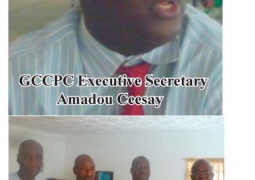The
Forum for the Exchange of Ideas for Development (FOREID) at the weekend hosted
lectureon “Democratic Transitions, Good Governance and the Rule of Law.
Speaking
at the lecture, Prof Abdoulaye Saine,internationally renowned academic and
activist, said such topical issues have been the focus of his scholarly work
for many scholars for nearly thirty years or more.
He
said it was a rich and varied literature in which The Gambia occupies a special
place because of its unique status as one of four functional democracies in
Africa until the 1994 coup that ushered in a deeply repressive polity.
In
his lecture, he pointed out that Gambian living oversees have worked tirelessly
to bring an end to the twenty-two-year tyranny that deeply traumatized Gambians
and shook to the core Gambia’s social, political, economic and moral fabric.
It
was a long and difficult road to the current political dispensation and
Gambians need not be reminded of the uncertainty, instability and reign of
terror that preceded it, he added.
“This
meant that many Gambians overseas were rendered persona non grata in the
country of their birth for years,” he said.
He
highlighted that in theearly 1950s and 1960s, political and economic theorists
focused on pattern variables that would serve as prerequisites or preconditions
for political and economic development in the newly independent states of
Africa, Asia and the Caribbean.
The
theories of modernisation in political and economic development spearheaded
mostly by American scholars, such as Almond and Powell, Samuel Huntington, Walt
Rostow, among many others, sought to provide both theoretical and empirically
based roadmaps by which the so-called emerging states could move from their
relative “underdevelopment” to levels of political and economic stability
similar to those of Europe and the USA.
He
said many scholars also charged that political and economic development
theories and strategies had also failed to liberate or emancipate the poor and
may have contributed to deepening social and economic cleavages, political
instability and growing political violence in the so-called “Third-World”.
The
1994 coup ended the rule of the longest serving functional democracy in Africa,
he stated, sayingcivilian rule by the APRC with a subsequent referendum over
the hastily drafted constitution in which term limit and other age requirements
for the president were lowered or expunged paved the way for an APRC
dictatorship that lasted twenty-two years.
Over
the years, the political voices at home and Diaspora Gambians also joined the
push for a coalition of all political parties that overthrew Jammeh after
Gambia had suffered 22 years of dictatorship.
Social
and other media attacks aided by the international press further isolated
Jammeh and his regime, he divulged, adding that Gambians raised funds to
support a slowly coalescing opposition led by Mr Adama Barrow.
The
2016 presidential election brought to a decisive end Jammeh’s twenty-two-year
misrule and ushered in a new political dispensation that Gambians had hungered
for.
Prof
Saine added that in his many conversations during his six-week stay with
Gambians across the political spectrum there was concern expressed over cabinet
appointments and a sense of entitlement that appears to grip the new regime.


